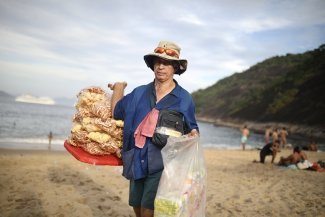Lucía Pineda at a press conference in Medellín, Colombia,, during the General Assembly of the Organization of American States on 26 June 2019.
On the night of 21 December 2018, Nicaraguan police stormed the headquarters of TV channel 100% Noticias. Its journalists, fearing arrest, had been living on the premises for the past month. That night, the police not only raided the building but also violently arrested the channel’s editor-in-chief Lucía Pineda and director Miguel Mora. Both were imprisoned as ‘political prisoners’ for a total of 172 days.
The arrests of Pineda and Mora took place against the backdrop ofthe worst socio-political crisis in the central American country’s history since the dictatorship of the 1980s. Violence broke out on 18 April 2018 – over President Daniel Ortega’s planned pension system reform – and according to data from the group of experts appointed by the Inter-American Commission on Human Rights, it has so far claimed 350 lives and led to more than 2,000 people being injured and around 600 jailed on political grounds. Since April of this year, around 90 per cent of these prisoners have been released, in stages. Their release is part of an agreement reached in the negotiations held under the auspices of the Organization of American States (OAS).
Nicaraguan journalist Lucía Pineda, who was part of this group of 600 political prisoners, was released on 11 June after spending almost six months behind bars.
Following her release, she talked about the constant psychological torture to which she had been subjected in El Chipote, a detention centre dating back to the dictatorship that is said to be a torture centre of the National Police. Deprived of any human contact, she remained in silence, except during the police interrogations, held around seven times a day on average. Other detainees, she recounts, were subjected to physical torture.
Following an event entitled ¿Hacia dónde va Nicaragua? (Where is Nicaragua headed?) organised within the framework of the General Assembly of the OAS from 26-28 June in Medellín, Colombia, Pineda spoke to Equal Times about the state of journalism in Nicaragua and her views regarding the political direction her country might take in the wake of the ‘ultimatum’ – as it is seen by the opposition and analysts – given to Ortega by OAS on 28 June. That is, the call made by the general assembly of the OAS for a commission to be set up with a view to securing a “peaceful and effective solution to the political and social crisis in Nicaragua” and to report back “within a maximum of 75 days”.
Pineda feels that the international community needs to act fast, because the regime is playing for time. Around 90 political prisoners are still being held in various detention centres, she tells us, and new arrests are being made, targeting the opposition, human rights defenders, media workers and dissidents.
Why, out of all the Nicaraguan media, did the government decide to raid the headquarters of 100% Noticias, and to arrest you?
100% Noticias was the only round-the-clock TV news channel that was reporting on the repression imposed by Daniel Ortega on the people of Nicaragua. As of 18 April 2018, he essentially ordered his supporters to crackdown on protesters, and on journalists. From day one, pro-government forces stole TV equipment from us, the censors took us off the air for six days, and it was only thanks to public pressure that we managed to re-establish the signal. We were accused of inciting hatred, when all we were doing was reporting on what was happening and, the truth is, the government had embarked on a brutal campaign of repression.
What is the situation at 100% Noticias and the state of journalism in Nicaragua right now?
We were released two weeks ago but they haven’t given us back our equipment. The TV channel is still under police control and so is the newsroom of journalist Carlos Fernando Chamorro [El Confidencial], who is currently in exile in Costa Rica. We are demanding that our television channel be returned to us and that the court case [against 100% Noticias] be closed, as it is still open.
We were released under the Amnesty Law [passed by the government-controlled Nicaraguan parliament], which was essentially passed to provide a ‘self-amnesty’ for the regime and its sympathisers, for all the crimes committed against the people of Nicaragua. Our hands [those of Nicaragua’s journalists] are clean. We have not committed any crime. Our only ‘crime’, so to speak, has been to report on the truth and to put our media at the disposal of the people and their needs. And the price has been jail, censorship and exile, as witnessed by the 80 or so journalists currently in exile.
If the repression, as you have commented, is still underway in Nicaragua, what is the government actually hoping to achieve through the Amnesty Law and the release of political prisoners?
To buy time, time to breathe and to make it to the next elections in 2021, because the OAS is pushing for early elections to be held in 2020.
Under the Amnesty Law, you can be re-imprisoned for the same ‘crime’ [‘fomenting and inciting hatred and violence’ and ‘provoking, proposing and conspiring to commit terrorist acts’, which is what you were charged with on your arrest, whilst carrying out your work as journalists]. Will you carry on reporting if the threat persists?
Nicaraguan journalism has displayed determination, dignity and courage in its fight to defend our right to inform, our freedom of expression and the right of citizens to protest. We are still under threat, but we have nevertheless managed to defeat censorship, as audiences have largely switched to alternative media [including Nicaragua Actual, Voces en Libertad and Nicaragua Investiga in Costa Rica, a new wave of media led by journalists in exile].
I will continue with my work. We will restore the channel, come what may. We have been working nonstop and have met with a number of people to see if they can convince Daniel Ortega to cease the hostilities. We are going to reorganise the newsroom, because six of our journalists have gone into exile. We are going to explore alternatives, as well as the best time for reopening 100% Noticias.
In your view, are the Ortega government’s days counted?
The regime is unsustainable. It cannot sustain itself with arms and repression, that is not the way to govern a country. It is hard to say how long it will take to fall. It is in Daniel Ortega’s hands.
Right now, we are asking for the deadline to be brought forward for the submission of the report by the high-level commission [set up on the orders of the OAS, in line with the resolution of 28 June. The report is currently due around the second week of September]. [Almost] three months means allowing the problem to drag on even longer and giving Daniel Ortega’s regime time to breathe.










